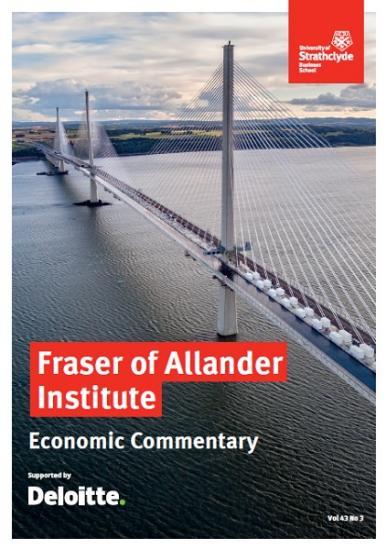The impact of Brexit uncertainty has cost the Scottish economy around £3 billion
23rd October 2019

Moving toward a deal, but long-term challenges just about to start: Fraser of Allander Institute Economic Commentary.
Make or break for UK's exit from EU in coming days - but uncertainty to remain for foreseeable future.
The impact of Brexit uncertainty has cost the Scottish economy around £3 billion - relative to where it would have been - according to new research from the Fraser of Allander Institute.
In its latest Economic Commentary, supported by Deloitte, the University of Strathclyde-based research institute highlights how growth has remained sluggish over the past year with firms putting off investment as they await the outcome of the negotiations over the UK's exit from the EU.
The Institute also points out that whilst it is possible that the UK's exit from the EU will be finally ratified in the coming hours, days or weeks, this will not mark the end of the challenges facing Scottish businesses.
Professor Graeme Roy, Director of the Institute, said: "There are signs that Boris Johnson may be able to secure safe passage of his new deal with the EU, albeit perhaps not by the 31 October deadline, so that the UK will finally leave the EU three-and-half years from the Referendum.
"Securing a deal will help lift some of the fog of uncertainty that has hung over the Scottish economy in recent times. As a result, in the short-run, the economic outlook should improve. By avoiding a ‘no deal' outcome, and all that would entail, growth is likely to move ahead of previous forecasts.
"However the nature of the ‘deal’, and in particular the intention to move to one of the ‘hardest’ forms of Brexit means that the long-term challenges for the Scottish and UK economies will be considerable.
Mairi Spowage, Deputy Director of the Institute, said: “The recent Brexit uncertainty has clearly had a negative impact on the Scottish economy. Investment remains well below trend and as a result growth continues to be sluggish.
“We estimate that the Scottish economy is around 2%, or £3 billion, smaller than it otherwise would have been.
“Some of this hit to Scotland’s economy may be clawed back as businesses see a clearer path ahead. But nothing within this Brexit process can be taken for granted. And whilst a deal to leave may soon be agreed, the nature of the UK’s future relationship with the EU is far from certain. Debates over Scotland’s future constitutional status are likely to intensify."
John Macintosh, Tax Partner, Deloitte, said: “Whatever the outcome of Brexit, profound change is ahead and businesses need to be agile to respond. From engaging with staff and addressing the potential of legal and regulatory change to ensuring supply chains are robust and ready, there are a number of factors that can be built into contingency plans.
“There are also wider, longer-term issues to consider, many of which have been side-lined by the current political climate but will have considerable impact on the Scottish economy such as stagnant productivity growth, our ageing population and meeting ambitious climate change targets. However, Scotland is renowned for its resilience and with careful planning, there are opportunities for businesses to rise to the challenges and adapt to change."
Away from Brexit, the Commentary discusses the government’s commitment to secure net zero emissions by 2045.
Mairi Spowage added: “One of the frustrating aspects of Brexit is that important discussions about the future direction of Scotland’s economy have been crowded out.
“One exception to this has been climate change. The Scottish Government has been quite rightly praised for its response, with Scotland now widely regarded as world leader.
“But ambitions and targets can only take you so far. And the scale of the challenge in reducing emissions at such a scale and pace should not be underestimated.
“Scotland has made good progress in certain areas, most notably renewable electricity generation, but in many others, such as transport and heat, we are at an earlier stage.
“Arguably many of the changes we have seen so far have been ‘quick-wins’. Future changes will have a much more direct impact on our day-to-day lives and will require a radical change to our behaviours and attitudes. Not all of these will be easy or politically popular.
“But with such change come economic opportunities. However, Scotland has a mixed track record so far in securing jobs and investment from renewable and low carbon technologies. Much more effort is required by both the Scottish and UK governments to ensure that Scotland gains from the economic opportunities that the low carbon transition will provide."
Today’s report lays out different scenarios for growth in Scotland over the next few years.
These include scenarios ranging from a disorderly exit from the EU, to a scenario where confidence returns, unlocking business investment and boosting the economy to nearer trend growth.
The Institute’s central forecast, based on an orderly departure at some point in 2019, predicts growth of 1.0% in 2019, 1.2% for 2020, and 1.3% for 2021.
Read the full report at https://www.sbs.strath.ac.uk/download/Fraser/201910/20191023-Commentary.pdf
